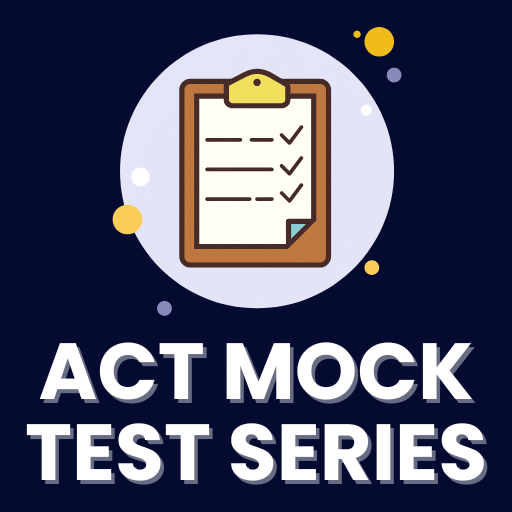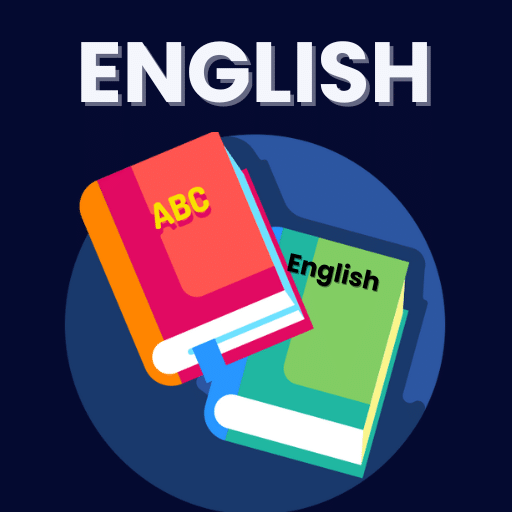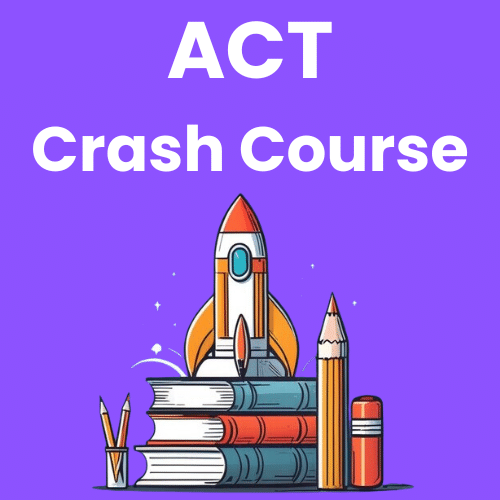ACT Exam preparation at EduRev
1. ACT test:
The ACT test is a standardized exam administered to high school students in the United States. It assesses their knowledge and skills in English, mathematics, reading, and science. The test consists of multiple-choice questions and an optional essay section. It is commonly used by colleges and universities as part of their admissions process. Students can prepare for the ACT test by studying content, practicing with sample questions, and familiarizing themselves with the test format.
2. ACT registration:
ACT registration is the process by which students sign up to take the ACT test. To register, students need to create an ACT account, provide personal information, choose a test date and location, and pay the registration fee. It is important to register early to secure a preferred test date and test center. Late registration and standby testing options may also be available. Students should carefully review registration deadlines and requirements to ensure a smooth registration process.
3. ACT scores:
ACT scores are the results obtained by students who have taken the ACT test. The ACT score report includes individual scores for each section of the test, as well as a composite score. The composite score, ranging from 1 to 36, is an average of the four section scores. These scores are used by colleges and universities to evaluate a student's academic abilities and potential for success. Students can access their scores online and send them directly to colleges or scholarship programs.
4. ACT prep:
ACT prep refers to the process of preparing for the ACT test. Effective preparation involves reviewing content, practicing with sample questions, and developing test-taking strategies. Many resources are available to help students with ACT prep, including study guides, online courses, tutoring services, and practice tests. It is important for students to create a study plan and allocate sufficient time to cover all test sections and practice adequately.
5. ACT practice test:
ACT practice tests are tools that simulate the actual ACT test experience. They are designed to help students familiarize themselves with the test format, assess their current knowledge and skills, and identify areas that need improvement. Practice tests are available in various formats, including online platforms, printed books, and downloadable PDFs. By taking practice tests, students can gain confidence, develop effective time management strategies, and refine their test-taking techniques.
6. ACT test dates:
ACT test dates are predetermined days on which the ACT test is administered. The test is typically offered multiple times throughout the year, allowing students to choose a test date that suits their schedule. It is important to be aware of registration deadlines and plan accordingly. Students should consider their academic commitments, availability for preparation, and target college application deadlines when selecting an appropriate test date.
7. ACT exam:
The ACT exam is another term used to refer to the ACT test. It is a comprehensive assessment of a student's academic abilities in English, mathematics, reading, and science. The exam is administered under standardized conditions and has a specific time limit for each section. Students should carefully read and follow the instructions provided during the exam to ensure accurate completion of the test. The ACT exam plays a significant role in college admissions and scholarship opportunities.
8. ACT study guide:
An ACT study guide is a resource that provides comprehensive information and strategies to help students prepare for the ACT test. Study guides typically cover all test sections, offering explanations, examples, and practice questions. They may also include tips for effective studying, time management, and test-taking techniques. Students can find study guides in bookstores, libraries, and online platforms. It is important to choose a study guide that aligns with the latest ACT test format and content.
9. ACT tips:
ACT tips are valuable pieces of advice that can enhance a student's performance on the ACT test. These tips cover various aspects of test preparation and test-taking strategies. For example, it is recommended to pace oneself during the test, manage time wisely, read questions carefully, and guess intelligently when unsure. Other tips may include utilizing process of elimination, practicing with sample questions, and reviewing content in areas of weakness. Implementing these tips can improve confidence and overall scores.
10. ACT online:
ACT online refers to the availability of ACT test preparation resources and services on the internet. Students can access a wide range of online platforms that offer practice tests, study guides, video tutorials, and interactive lessons. Online resources provide flexibility and convenience, allowing students to study at their own pace and access materials from any location with an internet connection. It is important to choose reputable and reliable online sources for ACT preparation.
11. ACT tutoring:
ACT tutoring involves working with a qualified instructor or tutor who provides personalized guidance and support in preparing for the ACT test. Tutors are experienced in the test content and format, and can help students identify their strengths and weaknesses. They offer targeted instruction, practice opportunities, and strategies to improve performance. ACT tutoring can be conducted in-person or online, depending on the student's preferences and availability.
12. ACT test centers:
ACT test centers are designated locations where the ACT test is administered. These centers are equipped with the necessary facilities and staff to ensure a secure and standardized testing environment. Students can choose a test center that is convenient for them, considering factors such as distance, transportation, and availability. It is important to arrive at the test center on time and follow all instructions provided by the test center staff.
13. ACT test format:
The ACT test format refers to the structure and organization of the ACT test. The test consists of four sections: English, mathematics, reading, and science. Each section has a specific number of questions and a time limit. The English and reading sections are multiple-choice, while the mathematics section includes multiple-choice and student-produced responses. The science section presents scientific passages and data interpretation questions. Familiarizing oneself with the test format is crucial for effective preparation and test performance.
14. ACT test tips:
ACT test tips are specific recommendations aimed at helping students maximize their scores on the ACT test. These tips can include strategies for each section of the test, such as time management techniques, effective reading strategies, and approaches to solving math problems efficiently. Furthermore, tips may also emphasize the importance of practicing with sample questions, reviewing content, and staying calm and focused during the test. Implementing these test tips can lead to improved performance and confidence.
15. ACT test questions:
ACT test questions are the specific inquiries presented to students during the ACT test. Each section of the test contains a variety of question types designed to assess different skills and knowledge areas. The questions are multiple-choice, with four answer choices for each question. It is important for students to read and understand each question carefully before selecting the best answer. Practicing with ACT test questions can help students become familiar with the question format and develop effective test-taking strategies.
Additional Information about ACT Preparation
ACT Exam Pattern 2025-2026
To start your ACT exam preparation, it is essential to understand the exam pattern.
The ACT exam pattern will help candidates to understand the structure of the ACT Exam question paper and marking scheme.
Students can find the complete detailed explanation of the ACT Exam pattern on EduRev.
It includes details about the exam date, syllabus, language, question paper, and paper analysis.
ACT Syllabus 2025-2026 PDF Download
Access the comprehensive ACT Syllabus for 2025-2026 in PDF format with EduRev.
This valuable resource provides the detailed subject syllabus, exam pattern, and language information for efficient exam preparation.
Students can download and study the syllabus, along with study materials, notes, and recommended best books available on EduRev.
Enhance your preparation with mock tests, sample papers, and question papers for paper analysis.
Additionally, Toppers' notes and coaching assistance are at your disposal to excel in the ACT exam.
Achieve outstanding results and boost your confidence with EduRev's curated videos and preparation tips.
ACT Books
Prepare for the ACT exam with the best books available on EduRev. These books cover the entire syllabus and exam pattern,
ensuring comprehensive preparation. students can access study material, sample papers, and subject-specific notes to enhance their understanding.
EduRev offers coaching support and paper analysis to sharpen exam skills. With mock tests and question papers,
students can practice effectively and gain confidence. Stay updated with the exam date and language requirements for a smooth experience.
Toppers' notes are an additional resource for valuable insights. EduRev's official website provides access to all these resources,
helping you excel in the ACT exam effortlessly.
ACT Study Material and Notes PDF Download
Prepare for the upcoming ACT exam with EduRev's Study Material and Notes in PDF format.
Access a comprehensive collection of subject-specific study materials and notes to cover the entire syllabus.
These resources are designed to aid your preparation, ensuring a thorough understanding of the exam pattern, language, and syllabus.
Boost your confidence with practice papers and question papers for paper analysis. EduRev offers coaching support and toppers' notes to excel in the ACT exam.
Download the study material and notes from EduRev's official website and embark on a successful preparation journey.
ACT Previous Year Papers
ACT Previous Year Papers by EduRev provide valuable resources for exam preparation.
Access question papers, paper analysis, and practice papers to understand the exam pattern and syllabus thoroughly.
Enhance your preparation with best books, study materials, and toppers' notes.
Stay updated with the latest exam date and official website information. Utilize mock tests and sample papers to practice in the exam language.
Boost your performance with insightful preparation tips and coaching videos.
Ace the ACT exam confidently with EduRev's comprehensive study material and expert guidance. Prepare effectively and excel in your upcoming exam.
Important Questions for ACT
Get ready to ace the ACT exam with a focus on important questions.
These questions give valuable insights into the exam's format and difficulty, helping you gauge your readiness.
Access various question papers, including sample papers, previous years, and mock tests, to understand the exam's scope.
Analyze these questions to identify patterns and essential topics. Strengthen your knowledge with study material and notes.
EduRev provides an extensive collection of important questions to support your preparation and boost your chances of achieving outstanding results.




![Grid View]()
![List View]()


 (150K+ ratings)
(150K+ ratings)
![]() (150K+ ratings)
(150K+ ratings)
 (150K+ ratings)
(150K+ ratings)

















































